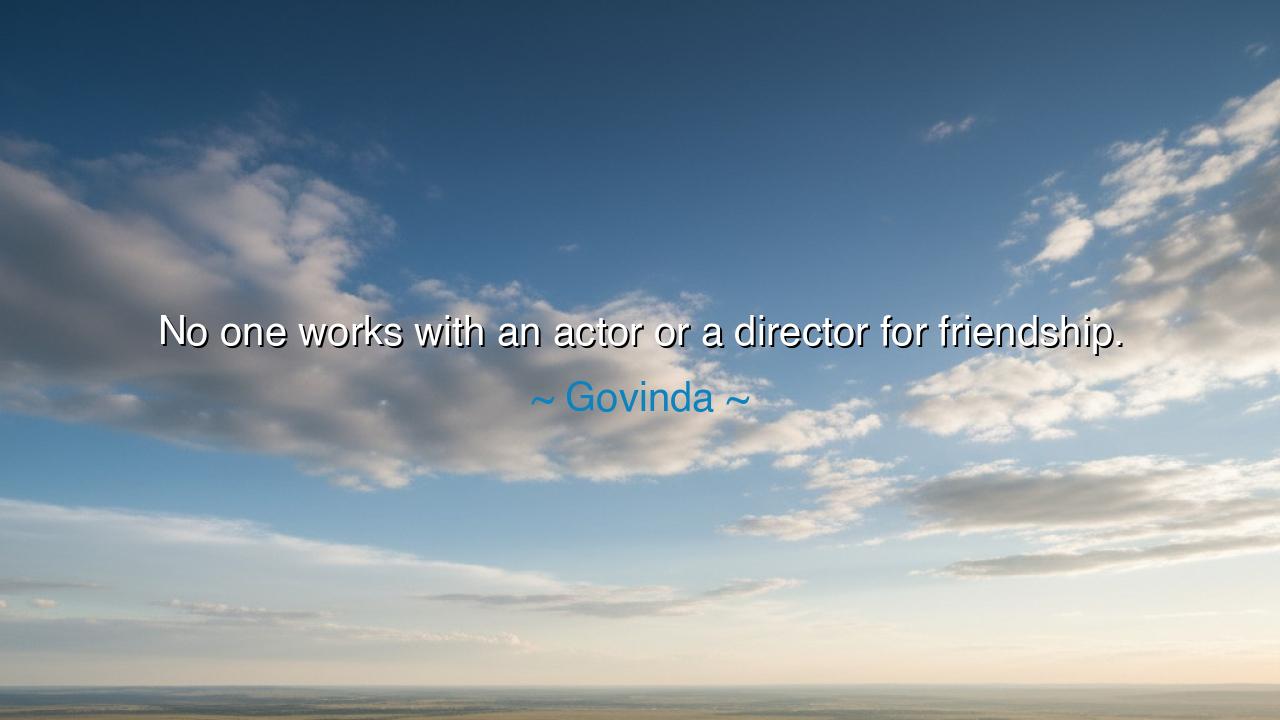
No one works with an actor or a director for friendship.






Hear the bold and unflinching words of Govinda, the legendary actor of Indian cinema, who once said: “No one works with an actor or a director for friendship.” Though simple in form, these words carry the gravity of experience — the voice of one who has walked through the dazzling lights and shadows of fame, who has seen the masks behind the smiles, and who understands the fragile boundary between affection and ambition. In them lies a truth as old as human endeavor: that in the realm of work, art, and success, friendship often bends before the weight of self-interest, and only those who see this clearly can walk the path of creation without illusion.
Govinda, a man who rose from humble beginnings to become one of the brightest stars of Indian cinema, speaks here not in bitterness, but in wisdom. In the vast world of film, where egos clash and fortunes change with every sunrise, loyalty is often tested by profit, power, and fame. When he says no one works with an actor or a director for friendship, he reveals a hard-earned truth — that the industry, like life itself, often moves by necessity, not sentiment. People come together to serve a purpose — to build, to perform, to achieve — and when that purpose ends, so too may the closeness that once seemed eternal. Yet this truth, though sobering, is not meant to dishearten; rather, it invites us to see clearly, to give without illusion, and to love without expectation.
The ancients, too, understood this distinction between personal affection and professional purpose. The philosopher Confucius taught that each relationship in life has its rightful order — that harmony arises when one knows the proper boundary of duty and emotion. To mistake professional cooperation for friendship is to sow confusion; to cling to it when it has served its purpose is to invite sorrow. Govinda’s insight echoes this ancient wisdom: that true friendship is rare, for it exists outside the realm of exchange. In the workplace — whether on the stage, the battlefield, or the marketplace — men are united by shared goals, not shared hearts. The wise one works with clarity, knowing when to give trust and when to guard it.
Consider the story of Niccolò Machiavelli, who served faithfully as a diplomat in Renaissance Florence. He worked for powerful patrons and rulers, believing his skill and loyalty would earn him security and respect. Yet when power changed hands, his “friends” abandoned him, and he was cast aside, imprisoned, and forgotten. From this harsh education, Machiavelli learned what Govinda too had seen — that in matters of ambition and craft, friendship is seldom the currency of exchange. Men are loyal not to persons, but to positions; not to hearts, but to advantage. And yet, Machiavelli did not despair. Like Govinda, he transformed his disappointment into insight, turning his pain into the philosophy that still teaches the world today.
But we must not mistake Govinda’s words for cynicism. He does not deny the existence of friendship; he warns us only not to expect it where duty and profit rule. True friendship, he implies, is sacred precisely because it lies beyond interest — it is the bond that remains when all gain is gone. Those who understand this will not be deceived by flattery nor wounded by betrayal, for they will see the world as it is and love as it deserves. In this way, wisdom becomes armor — a shield against the fickleness of fortune and the frailty of human motives.
There is, too, a deeper courage in these words — the courage to stand alone. To realize that few work for friendship is to awaken to one’s own power. The artist, the leader, the dreamer must walk through solitude to find truth. Govinda, through years of success and struggle, teaches us that integrity is the only constant companion. Others may come and go, drawn by benefit or reputation, but one’s own conscience — that inner voice that speaks of right and wrong — remains steadfast. To live by that voice is to build a foundation stronger than applause, stronger even than love.
The lesson, then, is timeless: work with others, but do not confuse cooperation with devotion. Seek excellence in your craft, not validation from those who share your path. Let friendship be free from transaction, and let work be guided by purpose. If friendship blossoms amid labor, cherish it — but if it fades when the task is done, release it without bitterness. For the wise do not mourn the impermanence of worldly bonds; they rejoice in the clarity that remains when illusion falls away.
And so, dear listener, remember Govinda’s truth: in the theater of life, not all who stand beside you are your friends. Yet this need not harden the heart — only strengthen it. Be kind, but discerning; be open, but unafraid to stand alone. Work with love, but anchor your joy not in the fleeting warmth of friendship, but in the eternal light of honor, authenticity, and self-respect. For in a world where many serve for gain, the one who serves for truth becomes immortal — and that, above all, is the highest friendship one can ever find.






AAdministratorAdministrator
Welcome, honored guests. Please leave a comment, we will respond soon